中考英语词形变换专题指导
- 格式:docx
- 大小:59.22 KB
- 文档页数:24
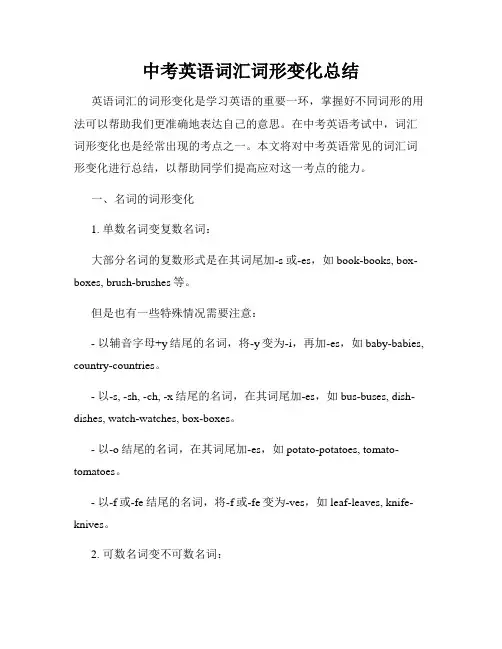
中考英语词汇词形变化总结英语词汇的词形变化是学习英语的重要一环,掌握好不同词形的用法可以帮助我们更准确地表达自己的意思。
在中考英语考试中,词汇词形变化也是经常出现的考点之一。
本文将对中考英语常见的词汇词形变化进行总结,以帮助同学们提高应对这一考点的能力。
一、名词的词形变化1. 单数名词变复数名词:大部分名词的复数形式是在其词尾加-s 或-es,如book-books, box-boxes, brush-brushes等。
但是也有一些特殊情况需要注意:- 以辅音字母+y结尾的名词,将-y变为-i,再加-es,如baby-babies, country-countries。
- 以-s, -sh, -ch, -x结尾的名词,在其词尾加-es,如bus-buses, dish-dishes, watch-watches, box-boxes。
- 以-o结尾的名词,在其词尾加-es,如potato-potatoes, tomato-tomatoes。
- 以-f或-fe结尾的名词,将-f或-fe变为-ves,如leaf-leaves, knife-knives。
2. 可数名词变不可数名词:有些名词可以同时作为可数名词和不可数名词,表示单个事物时用作可数名词,表示一类事物时用作不可数名词。
例如,water可以表示一杯水(可数名词),也可以表示水这一类物质(不可数名词)。
3. 名词的单数形式:- 有些名词没有复数形式或者复数形式与单数形式相同,如sheep, fish, Chinese等。
- 有些名词形式变化不规则,如man-men, woman-women, tooth-teeth 等。
二、动词的词形变化1. 动词的时态变化:英语动词的时态变化较为复杂,常见的时态有一般现在时、一般过去时、一般将来时、现在进行时、过去进行时等。
- 一般现在时的基本形式为动词原形,表示经常性或普遍性的动作或状态,如I eat breakfast every day.(我每天吃早饭。
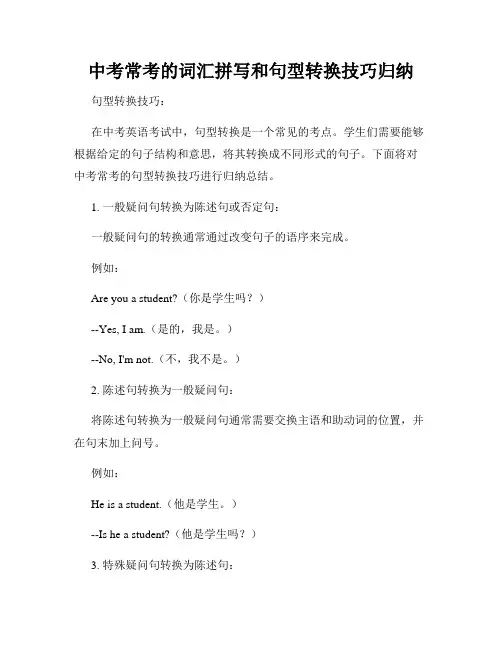
中考常考的词汇拼写和句型转换技巧归纳句型转换技巧:在中考英语考试中,句型转换是一个常见的考点。
学生们需要能够根据给定的句子结构和意思,将其转换成不同形式的句子。
下面将对中考常考的句型转换技巧进行归纳总结。
1. 一般疑问句转换为陈述句或否定句:一般疑问句的转换通常通过改变句子的语序来完成。
例如:Are you a student?(你是学生吗?)--Yes, I am.(是的,我是。
)--No, I'm not.(不,我不是。
)2. 陈述句转换为一般疑问句:将陈述句转换为一般疑问句通常需要交换主语和助动词的位置,并在句末加上问号。
例如:He is a student.(他是学生。
)--Is he a student?(他是学生吗?)3. 特殊疑问句转换为陈述句:特殊疑问句转换为陈述句需要将原句的疑问词替换为陈述句中对应的词语。
例如:What is your name?(你叫什么名字?)--My name is Mike.(我的名字叫迈克。
)4. 否定句转换为肯定句或一般疑问句:否定句转换为肯定句通常需要去掉否定词,并改变动词形式为肯定形式。
例如:I don't like bananas.(我不喜欢香蕉。
)--I like bananas.(我喜欢香蕉。
)否定句转换为一般疑问句则要交换助动词和主语的位置,并在句末加上问号。
例如:I don't like basketball.(我不喜欢篮球。
)--Don't you like basketball?(你不喜欢篮球吗?)5. 直接引语转换为间接引语:直接引语转换为间接引语通常需要改变动词的时态和人称,并在引语前后加上引号。
例如:"I like swimming," he said.(他说:“我喜欢游泳。
”)--He said that he liked swimming.(他说他喜欢游泳。
)词汇拼写技巧:除了句型转换,词汇拼写是中考英语考试中另一个常见的考点。
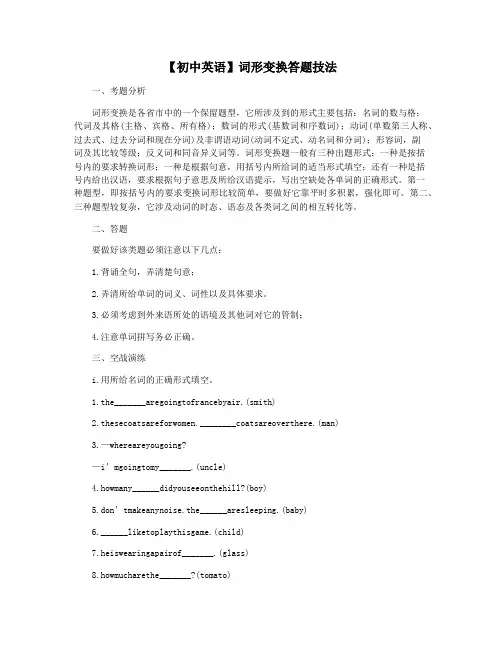
【初中英语】词形变换答题技法一、考题分析词形变换是各省市中的一个保留题型,它所涉及到的形式主要包括:名词的数与格;代词及其格(主格、宾格、所有格);数词的形式(基数词和序数词);动词(单数第三人称、过去式、过去分词和现在分词)及非谓语动词(动词不定式、动名词和分词);形容词,副词及其比较等级;反义词和同音异义词等。
词形变换题一般有三种出题形式:一种是按括号内的要求转换词形;一种是根据句意,用括号内所给词的适当形式填空;还有一种是括号内给出汉语,要求根据句子意思及所给汉语提示,写出空缺处各单词的正确形式。
第一种题型,即按括号内的要求变换词形比较简单,要做好它靠平时多积累,强化即可。
第二、三种题型较复杂,它涉及动词的时态、语态及各类词之间的相互转化等。
二、答题要做好该类题必须注意以下几点:1.背诵全句,弄清楚句意;2.弄清所给单词的词义、词性以及具体要求。
3.必须考虑到外来语所处的语境及其他词对它的管制;4.注意单词拼写务必正确。
三、空战演练i.用所给名词的正确形式填空。
1.the_______aregoingtofrancebyair.(smith)2.thesecoatsareforwomen.________coatsareoverthere.(man)3.—whereareyougoing?—i’mgoingtomy_______.(uncle)4.howmany______didyouseeonthehill?(boy)5.don’tmakeanynoise.the______aresleeping.(baby)6.______liketoplaythisgame.(child)7.heiswearingapairof_______.(glass)8.howmucharethe_______?(tomato)9.therearemany______inthebook.(photo)10.theradiosaysitwillbecloudyat______.(time)11.hesaidhehadbeentherethree_______.(time)12.alotof______arewatchingthefootballmatch.(people)13.two_____spokeatthemeetingyesterday.(japanese)14.therearesome______infrontofthehouse.(sheep)15.pleasehelpyourselftosome_______.(fish)16.therearemanydifferent______inthelake.(fish)17.hehascaughtten________.(fish)18.therearemany_______overthere.(factory)19.theshopisonehundred_______awayfromhere.(metre)20.bothtomandjimare______teachers.(man)参考答案1.smiths2.men’s3.uncle’s4.boys5.babies6.children7.glasses8.tomatoes9.photos10.times11.times12.people13.japanese14.sheep15.fish16.fishes17.fish(es)18.factories19.metres20.men。
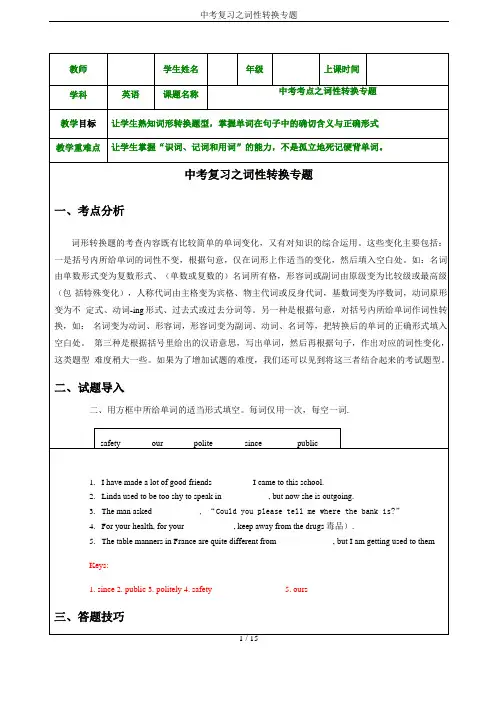
一、词形转换题的解题方法单词形式变化主要有两种:一是词的形、数、式的变化,一是词的派生变化。
在判断出词的变化之后还应该进一步审题,看是否需要使用复合的变化形式,这一点是很重要的。
做题时根据句子的意思和相关的词类、句法知识,首先确定空白处单词的词性,再把所给的单词变换成相应的形式。
例如:Mary works very(careful).分析:句中填副词形式carefully,因为修饰动词要用副词形式。
这时的词语变化主要集中在单词的变化上,也就是各种词性的变化和转换。
做这类题除了要了解各种词性的变化形式,还有一点十分重要,那就是语感。
如果你平时的口语比较好,朗读比较自然,你通常可以准确地读出答案来。
如:It's dangerous to run(cross) the street.分析:填across是根据前面的动词run得出的,因为通常情况下两个动词原形是不能一起使用的,而且常见到run across the street这种结构。
这类试题要求很高,做题时必须“形”“义”兼顾,根据句子内容,综合运用所学知识,既要考虑用词的准确,又要考虑词形变换,有时需进行两次变形。
如:Some famous(science) are going to give lectures in our university in August.分析:要先变science为scientist,然后根据前面的Some和后面的are将scientist变成复数形式scientists o二、词形转换题的解题技巧做好词形转换题,除了掌握正确的答题方法,在平时的学习过程中打好基础,练好基本功,还要掌握以下几点技巧:技巧一:名词形式变化。
名词的形式变化主要有单数、复数、所有格的变化。
例1:There are many students living at school; the(child) houses are all far from school.8.When arriving at the camp, we (ask) to ski (滑雪)down to filed by the coach.(2016嘉兴中考)9.She said the program (design) for some of the brighter teenagers to experience a different culture.10.They said it was dangerous for me, a girl, (travel) alone.11. 1 (keep) telling them I had been on a plane on my own before.(2016金华中考)12.The children rushed out of the classroom as soon as the bell(ring) for the end of class.When I go outside (play) games, he would drive our cats up to the trees.(2016台州中考)13.When Tony got to school, he found the classroom door is still(lock).14.When David's mother got back, he (play) games with John.Keys:1. left2. wants3. wondered4. join5. discusses6. is shinning7. increased8. were asked 9. was designed 10. to travel 11. kept 12. rang 13. to play 14. was playing技巧三:代词形式变化。
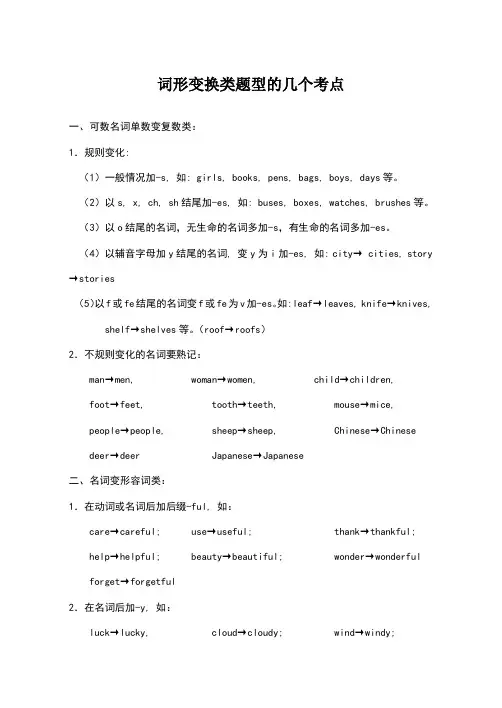
词形变换类题型的几个考点一、可数名词单数变复数类:1.规则变化:(1)一般情况加-s, 如: girls, books, pens, bags, boys, days等。
(2)以s, x, ch, sh结尾加-es, 如: buses, boxes, watches, brushes等。
(3)以o结尾的名词,无生命的名词多加-s,有生命的名词多加-es。
(4)以辅音字母加y结尾的名词, 变y为i加-es, 如: city→ cities, story →stories(5)以f或fe结尾的名词变f或fe为v加-es。
如:leaf→leaves, knife→knives, shelf→shelves等。
(roof→roofs)2.不规则变化的名词要熟记:man→men, woman→women, child→children, foot→feet, tooth→teeth, mouse→mice,people→people, sheep→sheep, Chinese→Chinesedeer→deer Japanese→Japanese二、名词变形容词类:1.在动词或名词后加后缀-ful, 如:care→careful; use→useful; thank→thankful;help→helpful; beauty→beautiful; wonder→wonderfulforget→forgetful2.在名词后加-y, 如:luck→lucky, cloud→cloudy; wind→windy;rain→rainy; sun→sunny, snow→snowynoise-noisy health→healthy3.在名词后加-y, 如:friend→friendly love→lovely day→daily4.方位名词加-ern,如:east→eastern west→western south→southernnorth→northern northeast→northeastern6.在名词后加-less, 变成否定含义的形容词。
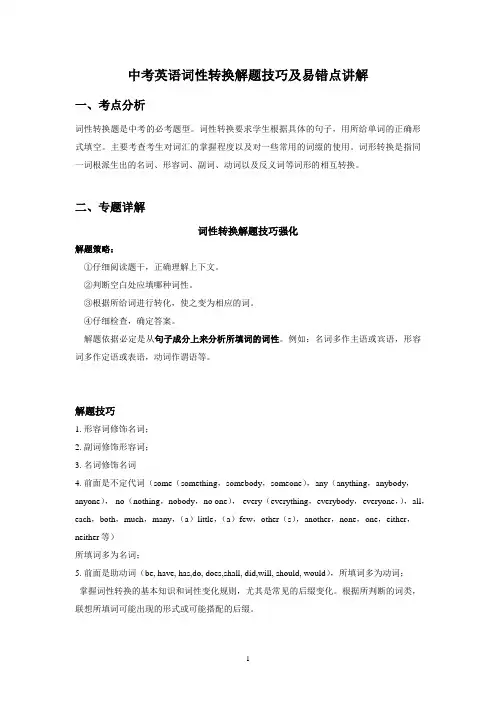
中考英语词性转换解题技巧及易错点讲解一、考点分析词性转换题是中考的必考题型。
词性转换要求学生根据具体的句子,用所给单词的正确形式填空。
主要考查考生对词汇的掌握程度以及对一些常用的词缀的使用。
词形转换是指同一词根派生出的名词、形容词、副词、动词以及反义词等词形的相互转换。
二、专题详解词性转换解题技巧强化解题策略:①仔细阅读题干,正确理解上下文。
②判断空白处应填哪种词性。
③根据所给词进行转化,使之变为相应的词。
④仔细检查,确定答案。
解题依据必定是从句子成分上来分析所填词的词性。
例如:名词多作主语或宾语,形容词多作定语或表语,动词作谓语等。
解题技巧1. 形容词修饰名词;2. 副词修饰形容词;3. 名词修饰名词4. 前面是不定代词(some(something,somebody,someone),any(anything,anybody,anyone), no(nothing,nobody,no one), every(everything,everybody,everyone,),all,each,both,much,many,(a)little,(a)few,other(s),another,none,one,either,neither等)所填词多为名词;5. 前面是助动词(be, have, has,do, does,shall, did,will, should, would),所填词多为动词;掌握词性转换的基本知识和词性变化规则,尤其是常见的后缀变化。
根据所判断的词类,联想所填词可能出现的形式或可能搭配的后缀。
词性转换分类汇总I.形容词——副词1、加lyquiet安静的 quick 快速的 slow慢的 beautiful美丽的 bright明亮的 careful仔细的 certain一定clear清楚 loud大声 sad难过的 wide广泛 serious严重的 usual通常 final最后 safe安全real真的 recent最近的 main主要的 accurate精确的2、去y加ilyeasy容易的 heavy大量angry生气的 hungry饥饿的happy 快乐的 lucky幸运的3、le结尾的,去e变ypossible可能 gentle轻柔的4、不变hard难的;努力地,猛烈地 fast 快early早 late 晚enough足够 straight笔直II. 动词——名词1、加er、or、ress加erfarm 耕种—农民 drive 驾驶—驾驶员司机teach 教—老师 work 工作—工人 write 写—作家 report 报道—记者 win 赢(winner)—获胜者 own 拥有—owner拥有者 paint画、粉刷---画家 manage 经营—经理 record 记录—录音机加oract--actor 男演员 visit—visitor观光者 invent--inventor 发明家 calculate—calculator计算器加resswait—waitress女服务员 act—actress女演员2、加ion结尾add—add i tion 增加 collect—collection 收集 discuss—discussion讨论 decide—decision决定 invent—invention发明物 invite—invitation 邀请 operate—operation手术 pollute—pollution 污染review—revision 复习 solve—solution解答 organize—organization组织 locate—location地点suggest—suggestion建议 protect---prote ction 保护3、加ingbegin—begi nn ing开始 build—building大楼 say—saying 谚语 paint—painting 绘画meet—meeting 会议4、其他serve—service 服务 speak—speech 演讲、言语 fish—fisherman 渔夫 enter—entrance 入口know—knowledge 知识 weigh—weight 重量 please—pleasure 愉快 develop—development 发展choose—choice选择 tour—tourist 游客die—death 死亡 succeed—success 成功fly—flight 飞行、航班 memorize—memory 记忆mix—mixture 混合物 cook—cook 厨师save—safety 安全 act—activity 活动 able—ability 能力III. 名词——名词art艺术—artist画家 science—scientist 科学家city—citizen市民 custom—customer 顾客office—officer 官员 engine—engineer工程师 friend—friendship 友谊business—businessman男商人 business—businesswoman女商人library—librarian 图书管理员 law法律—lawyer律师IV. 名词——形容词1、名词后加fulcare—careful 小心的 use—useful 有用的 help—helpful有帮助的 thank—thankful 感激的wonder—wonderful精彩的 power—powerful 强大的 harm—harmful 有害的2、名词后加ycloud—cloudy 多云的 rain—rainy 下雨的 wind—windy 有风的 snow—snowy 下雪的sun—su nn y 晴朗的 noise—noisy 吵闹的 health—healthy 健康的 fun—funny 滑稽的luck—lucky 幸运的3、名词后加lyfriend—friendly 友好的 love—lovely 可爱的 live—lively 活泼的4、形容词以al 结尾nation—national 国家的 education--educational 教育的 nature—natural 自然的tradition—traditional 传统的 medicine—medical 医药的 physics—physical 物理的chemistry—chemical 化学的 history—historical 历史的5、名词末尾的ce变成tdifference(s)—different 不同 importance—important 重要的6、名词后加enwood—wooden木制的 gold—golden金色的 (wool—woolen 羊毛的)7、名词以ness结尾kindness仁慈—kind仁慈的 illness病疾病--- ill有病的不健康的8、形容词后加ydifficult—difficulty 困难 honest—honesty诚实9、形容词后加domfree—freedom 自由 wise—wisdom 聪明10、其他danger—dangerous 危险的office—official 官方的、正式的fool傻瓜—foolish 愚蠢的west—western 西方的height高度— high高的 length长度—long 长的favour恩惠—favourite 最喜欢的foreigner外国人—foreign 外国的home家—homeless 无家可归的expense费用—expensive 昂贵的 truth真相—true 真实的wound创伤—wounded 受伤的pleasure—pleasant 另人愉快的/ pleased 满意的response相应反映--- responsible 负责的有责任的electricity电—electric电的—electrical 与电有关的—electronic 电子的V. 动词——形容词interest引起兴趣—interesting 有趣的/ interested 感兴趣的excite—exciting 令人激动的/ excited激动的 freeze—freezing 寒冷的/ frozen 冷冻的frighten—frightening 令人害怕的/ frightened害怕的forget—forgetful健忘的 / unforgettable 难忘的 depend—independent 独立的有主见的like—likely很有可能发生的有希望的 realize意识到—real 真的break—broken 碎的 follow—following 下面的 fill—full 满的、饱的enjoy—enjoyable使人愉快的 change—changeable 多变的 act—active 积极的attract—attractive 吸引人的 die—dead 死的 widen拓宽—wide 宽的 live—alive活的VI. 前缀possible—impossible (polite, patient)可能—不可能 tell—retell说—复述build—rebuild 建造—重建healthy—unhealthy健康的—不健康的honest—dishonest诚实—不诚实的appear—disappear出现—消失like—dislike 喜欢—不喜欢male—female 男性—女性VII. 国名——国籍Australia—Australian America—American Canada—Canadian Britain—British England—English Italy—ItalianFrance— French Germany—German (德国人复数German s)强化练习从句子成分角度完成下列习题:1. Thanksgiving is a ______ festival in the USA and Canada. (tradition)2. There were only a few _____ from the air-crash. (survive)3. After careful ____, the committee decided to recommend Mr. Smith for the post. (consider)4. Do you agree that it is important to make yourself _____? (understand)5. I’ve lived in Chongqing for several years and I’m now used to _______hot food. (eat)6. He has to check the _____ of a difficult word before he uses it. (spell)7. The businessman lost a _______ chance to make a big fortune. (gold)9. In some parts of this city, missing a bus means ______ for another hour. (wait)10. Her early ______ gave everyone a big surprise. (arrive)11. The little girl gave an ______ wonderful performance last night. (extreme)12. The more challenging the journey is, the ______ the young people will feel. (happy)13. There has not been a favorable ______ to your plan so far. (respond)14. After they got on the bus, they found two _______. (sit)15. What we have had is just part of the truth. We should try to get ___________ information about it. (far)16. Now more and more gardens are being built in our __________. (neighbour)17. _________ speaking, the computer has become an important part of our life. (general)18. It will ______ rain this afternoon, for the sky is so dark now. (impossible)19. Many people in China are not familiar with ________ customs. (west)20.The room is so dirty that a lot of __________ can be seen running here and there. (mouse)21. It's rude to look ________ at a person. (straight)22. There is no short-cut to _________. ( succeed )23. The reporter went to the sea with several _________ to look for the lost boat. (fish)24. There are many places of ________ interest in Shanghai. (history)25. Mr. Marko is one of the __________ of that factory. (engine)26. It’s ten _________ walk from here. You needn’t take a bus. (minute)27. Jacky told us an ________ story that everybody laughed happily. (amusement)28. Thanks for _______ me. I’ll do my best. (choice)29. It’s much ___________ to swim with your friend than to swim alone. (safe)30. It was snowing _________ outside. (hard)31. How many ___________ lessons do you have every week? (physical)32. They were well ____________ at a friend’s house. (service)33. The sun gives us light and ________. (hot)34. We saw her running _________ the street just now. (cross)35. I’ll do my homework more __________ next time. (care)36. In _________ to hard work, we need some good ways to succeed. (add)37. In the past punishment(惩罚)was decided by the university. The student had no ___________ but to accept it. (choose)38. A ___________ sight stopped them from going forward. (frighten)39. The visitors are ________ students. (main)40. Of all the boys, Li Ming studies ______. (hard)41. These modern machines work ____. (automatic)42. Actions speak _____ than words. (loud)43. I _________ where he comes from. (wonderful)44. We tried all sorts of __________, but they were all useless. (medical)45. Carl looks much ________ than before. (health)46. The little boy can run a marathon in __________ than three hours. (little)47. The lost calculator has been returned to its __________. (own)48. Even __________, he lost his job. (bad)49. Life today is becoming harder and busier, so everyone should have his own way of __________. (relax)50. I am fond of _________ fiction. (scientist)51. Could you tell me whether it is a ________ change or a physical change? ( chemistry )52. The students are not allowed to touch the ________ without permission. ( chemistry )53. Do you know who the telephone was________ by? (invention)54. We went to a beautiful lake and spent an _______________ day. (forget)55. What _____________ weather we are having now! (freeze)56. He tried to make more money to work out a solution to travelling _____________ (expensive)57. She _______ her face with her hands. (discover)58. Our house____________ an area of 200 square metres. (discover)59. The great_______ always teaches me how to _______ the ________ (paint)60. He is one of the most famous _________ in the university. (professional)答案:1-5 traditional;survivors;consideration;understood;eating6-10 spelling;golden;experienced;waiting;arrival;11-15 extremely;happier;response;seats;further16-20 neighborhood;Generally;possibly;western;mice21-25 straight;success;fishermen;historical;engineers;26-30 minutes';amusing;choosing;safer;hard31-35 physics;served;heat;across;carefully36-40 addition;choice;frightening;mainly;hardest41-45 automatically;louder;wonder;medicine;healthier46-50 less;owner;worse;relaxation;science51-55 chemical;invented;unforgettable;freezing55-60 expense;covered;covers;painter- paint-painting ;professor。
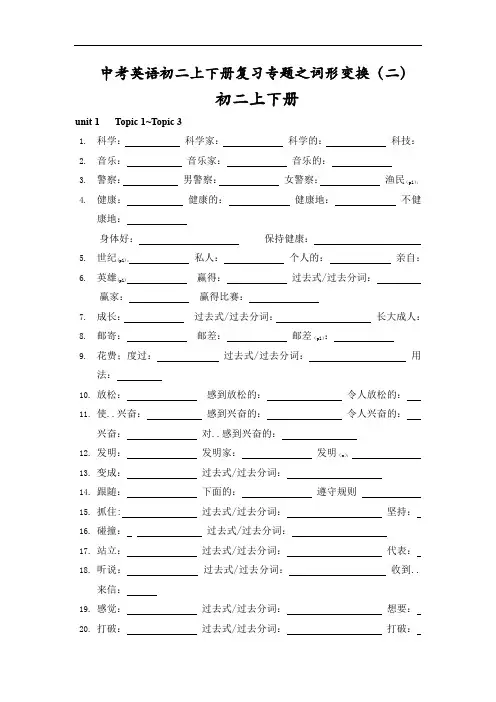
中考英语初二上下册复习专题之词形变换(二)初二上下册unit 1 Topic 1~Topic 31.科学:科学家:科学的:科技:2.音乐:音乐家:音乐的:3.警察:男警察:女警察:渔民(pl):4.健康:健康的:健康地:不健康地:身体好:保持健康:5.世纪(pl):私人:个人的:亲自:6.英雄(pl)赢得:过去式/过去分词:赢家:赢得比赛:7.成长:过去式/过去分词:长大成人:8.邮寄:邮差:邮差(pl):9.花费;度过:过去式/过去分词:用法:10.放松:感到放松的:令人放松的:11.使..兴奋:感到兴奋的:令人兴奋的:兴奋:对..感到兴奋的:12.发明:发明家:发明(n):13.变成:过去式/过去分词:14.跟随:下面的:遵守规则15.抓住: 过去式/过去分词:坚持:16.碰撞:过去式/过去分词:17.站立:过去式/过去分词:代表:18.听说:过去式/过去分词:收到..来信:19.感觉:过去式/过去分词:想要:20.打破:过去式/过去分词:打破:21.坏的:比较级/最高级:对..有害:22.生病的:疾病:患病:23.确定的:不确定的:确定地:24.生气的:生气地:生气:25.主要的:主要地:26.能够的;有能力的:能力:能够..:27.真实的:真正地:虚假的:28.玩耍:运动员:扮演重要角色:29.做梦:过去式/过去分词:梦想做..:30.打电话:过去式/过去分词:打电话:31.金子:金黄色的:32.欢呼声:快乐的:使振作:为..加油:33.离开:过去式/过去分词:动身:34.打架:为..作斗争:为..奋斗:35.适合的:过去式/过去分词:保持健康:unit 2 Topic 1~Topic 31.药:医疗的:吃药:2.牙齿:复数:刷牙:牙痛:3.建议(v):建议(n):提建议:4.躺:过去式/过去分词:现在分词:5.扮演:活跃的:演员:活动:6.建筑:过去式/过去分词:楼房:7.建议(v):建议(n):建议某人做..:采纳某人的建议:8.糟糕的:糟糕地:9.严重的:严重地:认真对待:10.虚弱的:软弱:不擅长:11.可能的:可能地:可能性:不可能的:12.最终的:最后:13.担忧:担心的:担心..:14.惊喜:惊奇的:令人吃惊的令某人吃惊的是:15.吸烟:吸烟者:香烟:16.胖的:比较级/最高级:瘦的:unit 3 Topic 1~Topic 31.诗:诗人:诗集:写诗:2.乐趣:有趣的:玩的开心:同义词:3.小提琴:小提琴手:4.平静:和平的:和平地:5.文化:文化的:中国文化:6.饥饿:饥饿的:7.收集:收藏品:集邮:8.粘贴:过去式/过去分词:坚持:9.介绍:介绍(n):介绍..给.:10.借出:过去式/过去分词:借进:11.接待:服务:12.同意:不同意:同意:13.出售:过去式/过去分词:卖光:14.打败:过去式/过去分词:15.燃烧:过去式/过去分词:16.醒来:过去式/过去分词:醒着的:17.奇迹:精彩的:难怪:18.使用:有用的:无用的:19.匹配:复数:20.剪;切:过去式/过去分词:砍到:21.黑色的:黑暗:unit 4 Topic 1~Topic 31.自然:天然的:2.绵阳:驯服者;绵阳(pl):3.死亡:死的:临终的:死亡(n)4.保护:保护(pl):保护..免受:5.喂养:过去式/过去分词:以..为食:6.思念;错过:失踪的:7.摇动:过去式/过去分词:握手:8.理解:过去式/过去分词:9.出现:消失:外观;起源:10.发送:过去式/过去分词:发出:11.知道:过去式/过去分词:有学识的:12.瘦的:比较级/最高级:肥胖的:13.悲伤的:悲伤地:忧伤14.正确的:正确地:真相;事实:15.使满意:快乐:高兴的:令人高兴的:16.清楚的:清楚地:清理:走开:17.正确的:正确地:纠正:unit 5 Topic 1~Topic 31.环境:环境的:2.噪音:吵闹的:宁静的:3.邀请:邀请(n):4.居住:充满趣味的:活着的:5.失败:失败(n):成功:6.感觉:过去式/过去分词:感觉(n):7.处理;给予:过去式/过去分词:处理:8.决定:决定(n):决定做..:9.通常的:通常地:罕见的:10.特别的:尤其;专门:11.轻柔的:轻柔地:12.沉默的:沉默:保持沉默:13.自豪的:骄傲:为..感到骄傲:14.有病的:疾病:健康的:15.困难的:困难:容易的:16.闻;气味:过去式/过去分词:17.爱;喜爱:可爱的:爱好者:18.帮助:助手:有帮助的:帮助某人做..:向某人寻求帮助:情不自禁做:19.大声的:大声地:unit 6 Topic 1~Topic 31.加拿大:加拿大人:亚洲:亚洲人:2.旅游:旅行者:旅游业:同义词:3.优势:缺点:法国:法语:4.中心:中心的:欧洲:欧洲的::5.村庄:村民:污染:污染(n)6.支付:过去式/过去分词:为..付款:7.等待:男服务员:女服务员:等待:8.获胜:过去式/过去分词:获胜者::向..解释清楚:9.解释:解释(n)10.恰当的恰当地不恰当的11.全部:完全的总计:12.安全的:安全:安全地:危险的:13. 安慰;舒服: 舒服的: 不舒服的:14. 缓慢的: 缓慢地: 快速的:15. 小心(v ): 小心的: 粗心地: 小心(n ):16. 北方: 北方的: 东方: 东方的:17. 南方: 南方的: 西方: 西方的:unit 7 Topic 1~Topic 31. 印度: 印度人: 俄罗斯: 俄罗斯人:2. 非洲: 非洲人: 日本: 日本人:3. 绅士: 绅士(pl ):4. 成功: 成功的: 成功地: 成功做..:5. 想象(v ): 想象(n ): 有想象力的: 想象力:6. 放;置: 建立: 释放: 摆放餐具:7. 教育(v ): 教育(n ): 有教育意义的:8. 发展(v ): 发展(n ): 发展中的:发达的: 随着..的发展:9. 快速的: 快速地: 快速发展:10. 有礼貌的: 有礼貌的: 没礼貌的:11. 值得..的 值得做某事:12. 后悔: 后悔的: 后悔做某事: unit 8 Topic 1~Topic 31. 围巾: 围巾(pl ):2. 原因: 理智的: 理智地:3. 办公室: 办公室职员: 高级官员:4. 传统: 传统的: 同义词:5. 个人: 个人的: 亲自:6. 讨论(v ): 讨论(n ):7. 选择(v ): 过去式/过去分词: 选择(n ):8. 意思是: 意义: 有意义的:过去式/过去分词: 决定做..:9. 决定于: 依靠的:: 依靠: 独立的:10. 进入: 入口:11. 传播: 过去式/过去分词: 展开:12. 混合(v ): 混合(n ): 混合:13. 光滑的: 光滑地: 粗糙的:14. 简单的: 简单地: 简化:15. 类似的: 类似地: 与..类似:16. 有耐心的: 耐心;病人:17. 采访: 采访者: 被采访者: 自己的: 主人: 独立的;独自的:。
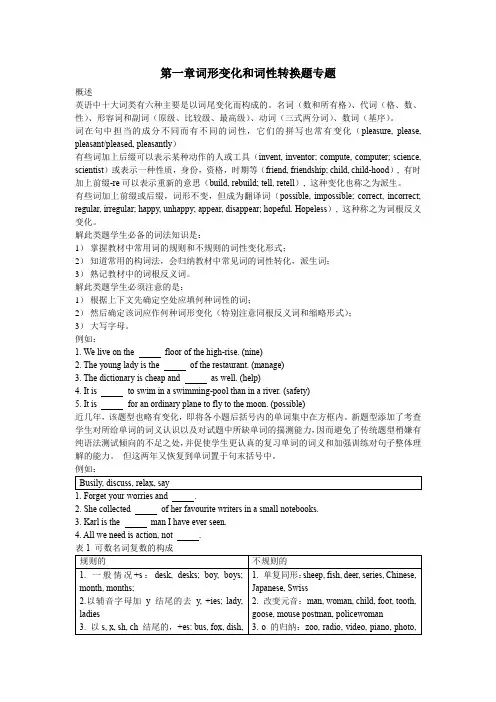
第一章词形变化和词性转换题专题概述英语中十大词类有六种主要是以词尾变化而构成的。
名词(数和所有格)、代词(格、数、性)、形容词和副词(原级、比较级、最高级)、动词(三式两分词)、数词(基序)。
词在句中担当的成分不同而有不同的词性,它们的拼写也常有变化(pleasure, please, pleasant/pleased, pleasantly)有些词加上后缀可以表示某种动作的人或工具(invent, inventor; compute, computer; science, scientist)或表示一种性质,身份,资格,时期等(friend, friendship; child, child-hood), 有时加上前缀-re可以表示重新的意思(build, rebuild; tell, retell), 这种变化也称之为派生。
有些词加上前缀或后缀,词形不变,但成为翻译词(possible, impossible; correct, incorrect; regular, irregular; happy, unhappy; appear, disappear; hopeful. Hopeless), 这种称之为词根反义变化。
解此类题学生必备的词法知识是:1)掌握教材中常用词的规则和不规则的词性变化形式;2)知道常用的构词法,会归纳教材中常见词的词性转化,派生词;3)熟记教材中的词根反义词。
解此类题学生必须注意的是:1)根据上下文先确定空处应填何种词性的词;2)然后确定该词应作何种词形变化(特别注意同根反义词和缩略形式);3)大写字母。
例如:1. We live on the floor of the high-rise. (nine)2. The young lady is the of the restaurant. (manage)3. The dictionary is cheap and as well. (help)4. It is to swim in a swimming-pool than in a river. (safety)5. It is for an ordinary plane to fly to the moon. (possible)近几年,该题型也略有变化,即将各小题后括号内的单词集中在方框内。
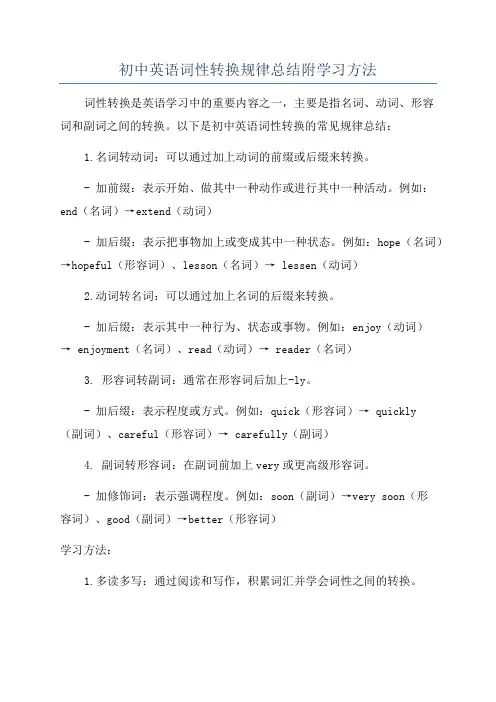
初中英语词性转换规律总结附学习方法词性转换是英语学习中的重要内容之一,主要是指名词、动词、形容词和副词之间的转换。
以下是初中英语词性转换的常见规律总结:1.名词转动词:可以通过加上动词的前缀或后缀来转换。
- 加前缀:表示开始、做其中一种动作或进行其中一种活动。
例如:end(名词)→extend(动词)- 加后缀:表示把事物加上或变成其中一种状态。
例如:hope(名词)→hopeful(形容词)、lesson(名词)→ lessen(动词)2.动词转名词:可以通过加上名词的后缀来转换。
- 加后缀:表示其中一种行为、状态或事物。
例如:enjoy(动词)→ enjoyment(名词)、read(动词)→ reader(名词)3. 形容词转副词:通常在形容词后加上-ly。
- 加后缀:表示程度或方式。
例如:quick(形容词)→ quickly(副词)、careful(形容词)→ carefully(副词)4. 副词转形容词:在副词前加上very或更高级形容词。
- 加修饰词:表示强调程度。
例如:soon(副词)→very soon(形容词)、good(副词)→better(形容词)学习方法:1.多读多写:通过阅读和写作,积累词汇并学会词性之间的转换。
2.制作词性转换表格:将常见的词性转换规律整理成表格,方便记忆和查找。
3.多做练习:完成词性转换的练习题,提高应用能力。
4.注意词义变化:在词性转换过程中,要注意词义的变化,确保转换后的词语在上下文中使用正确。
总之,词性转换是一个积累和灵活运用的过程,需要多做练习,多积累常见的词性转换规律,以提高自己的语言运用能力。
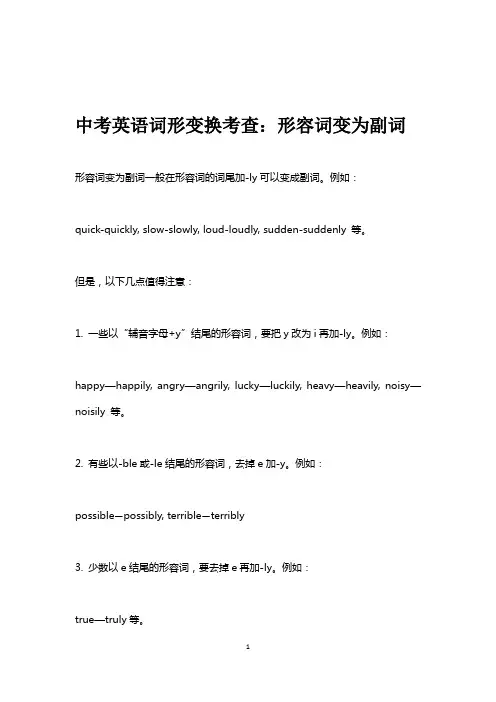
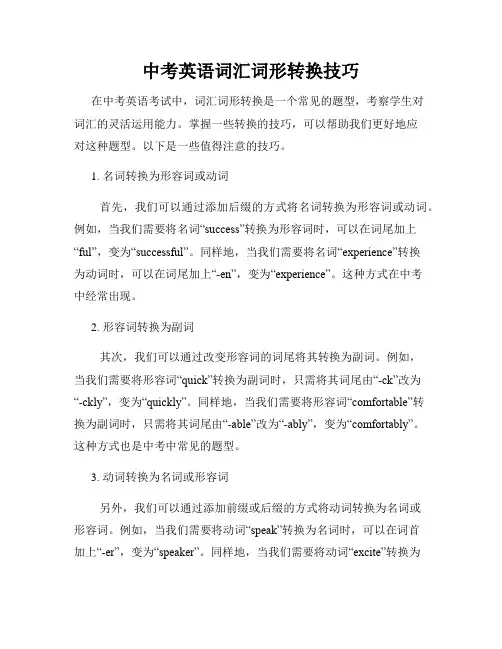
中考英语词汇词形转换技巧在中考英语考试中,词汇词形转换是一个常见的题型,考察学生对词汇的灵活运用能力。
掌握一些转换的技巧,可以帮助我们更好地应对这种题型。
以下是一些值得注意的技巧。
1. 名词转换为形容词或动词首先,我们可以通过添加后缀的方式将名词转换为形容词或动词。
例如,当我们需要将名词“success”转换为形容词时,可以在词尾加上“ful”,变为“successful”。
同样地,当我们需要将名词“experience”转换为动词时,可以在词尾加上“-en”,变为“experience”。
这种方式在中考中经常出现。
2. 形容词转换为副词其次,我们可以通过改变形容词的词尾将其转换为副词。
例如,当我们需要将形容词“quick”转换为副词时,只需将其词尾由“-ck”改为“-ckly”,变为“quickly”。
同样地,当我们需要将形容词“comfortable”转换为副词时,只需将其词尾由“-able”改为“-ably”,变为“comfortably”。
这种方式也是中考中常见的题型。
3. 动词转换为名词或形容词另外,我们可以通过添加前缀或后缀的方式将动词转换为名词或形容词。
例如,当我们需要将动词“speak”转换为名词时,可以在词首加上“-er”,变为“speaker”。
同样地,当我们需要将动词“excite”转换为形容词时,可以在词尾加上“-ing”,变为“exciting”。
这种方法在中考中也是常见的。
4. 名词转换为动词最后,我们可以通过改变名词的词性将其转换为动词。
例如,当我们需要将名词“friend”转换为动词时,只需在其词尾加上“-ize”,变为“befriend”。
同样地,当我们需要将名词“decision”转换为动词时,只需在其词尾加上“-ing”,变为“deciding”。
这种方式在中考中也是常见的题目。
结语:掌握词汇词形转换的技巧对于中考英语考试非常重要。
通过不断练习和积累,我们可以提高对词汇的灵活运用能力,更好地完成考试中的词汇转换题目。
中考英语词性转换解题技巧及易错点讲解一、考点分析词性转换题是中考的必考题型。
词性转换要求学生根据具体的句子,用所给单词的正确形式填空。
主要考查考生对词汇的掌握程度以及对一些常用的词缀的使用。
词形转换是指同一词根派生出的名词、形容词、副词、动词以及反义词等词形的相互转换。
二、专题详解词性转换解题技巧强化解题策略:①仔细阅读题干,正确理解上下文。
②判断空白处应填哪种词性。
③根据所给词进行转化,使之变为相应的词。
④仔细检查,确定答案。
解题依据必定是从句子成分上来分析所填词的词性。
例如:名词多作主语或宾语,形容词多作定语或表语,动词作谓语等。
解题技巧1. 形容词修饰名词;2. 副词修饰形容词;3. 名词修饰名词4. 前面是不定代词(some(something,somebody,someone),any(anything,anybody,anyone), no (nothing,nobody,no one), every(everything,everybody,everyone,),all,each,both,much,many,(a)little,(a)few,other(s),another,none,one,either, neither等)所填词多为名词;5. 前面是助动词(be, have, has,do, does,shall, did,will, should, would),所填词多为动词;掌握词性转换的基本知识和词性变化规则,尤其是常见的后缀变化。
根据所判断的词类,联想所填词可能出现的形式或可能搭配的后缀。
词性转换分类汇总I.形容词——副词quiet安静的 quick 快速的 slow慢的 beautiful美丽的 bright明亮的 careful仔细的 certain一定clear清楚 loud大声 sad难过的 wide广泛 serious严重的 usual通常 final最后 safe安全real真的 recent最近的 main主要的 accurate精确的2、去y加ilyeasy容易的 heavy大量angry生气的 hungry饥饿的happy 快乐的 lucky幸运的3、le结尾的,去e变ypossible可能 gentle轻柔的4、不变hard难的;努力地,猛烈地 fast 快early早 late 晚enough足够 straight笔直II. 动词——名词1、加er、or、ress加erfarm 耕种—农民 drive 驾驶—驾驶员司机teach 教—老师 work 工作—工人 write 写—作家report 报道—记者 win 赢(winner)—获胜者 own 拥有—owner拥有者 paint画、粉刷---画家manage 经营—经理 record 记录—录音机加oract--actor 男演员 visit—visitor观光者 invent--inventor 发明家 calculate—calculator计算器加resswait—waitress女服务员 act—actress女演员2、加ion结尾add—add i tion 增加 collect—collection 收集 discuss—discussion讨论 decide—decision决定invent—invention发明物 invite—invitation 邀请 operate—operation手术 pollute—pollution 污染 review—revision 复习 solve—solution解答 organize—organization组织 locate—location地点suggest—suggestion建议 protect---prote ction 保护3、加ingbegin—begi nn ing开始 build—building大楼 say—saying 谚语 paint—painting 绘画meet—meeting 会议serve—service 服务 speak—speech 演讲、言语 fish—fisherman 渔夫 enter—entrance 入口know—knowledge 知识 weigh—weight 重量 please—pleasure 愉快 develop—development 发展 choose—choice选择 tour—tourist 游客die—death 死亡 succeed—success 成功fly—flight 飞行、航班 memorize—memory 记忆mix—mixture 混合物 cook—cook 厨师save—safety 安全 act—activity 活动 able—ability 能力III. 名词——名词art艺术—artist画家 science—scientist 科学家city—citizen市民 custom—customer 顾客office—officer 官员 engine—engineer工程师 friend—friendship 友谊business—businessman男商人 business—businesswoman女商人library—librarian 图书管理员 law法律—lawyer律师IV. 名词——形容词1、名词后加fulcare—careful 小心的 use—useful 有用的 help—helpful有帮助的 thank—thankful 感激的wonder—wonderful精彩的 power—powerful 强大的 harm—harmful 有害的2、名词后加ycloud—cloudy 多云的 rain—rainy 下雨的 wind—windy 有风的 snow—snowy 下雪的sun—su nn y 晴朗的 noise—noisy 吵闹的 health—healthy 健康的 fun—funny 滑稽的luck—lucky 幸运的3、名词后加lyfriend—friendly 友好的 love—lovely 可爱的 live—lively 活泼的4、形容词以al 结尾nation—national 国家的 education--educational 教育的 nature—natural 自然的tradition—traditional 传统的 medicine—medical 医药的 physics—physical 物理的chemistry—chemical 化学的 history—historical 历史的5、名词末尾的ce变成tdifference(s)—different 不同 importance—important 重要的6、名词后加enwood—wooden木制的 gold—golden金色的 (wool—woolen 羊毛的)7、名词以ness结尾kindness仁慈—kind仁慈的 illness病疾病--- ill有病的不健康的8、形容词后加ydifficult—difficulty 困难 honest—honesty诚实9、形容词后加domfree—freedom 自由 wise—wisdom 聪明10、其他danger—dangerous 危险的office—official 官方的、正式的fool傻瓜—foolish 愚蠢的west—western 西方的height高度— high高的 length长度—long 长的favour恩惠—favourite 最喜欢的 foreigner外国人—foreign 外国的 home家—homeless 无家可归的 expense费用—expensive 昂贵的 truth真相—true 真实的wound创伤—wounded 受伤的pleasure—pleasant 另人愉快的/ pleased 满意的response相应反映--- responsible 负责的有责任的electricity电—electric电的—electrical 与电有关的—electronic 电子的V. 动词——形容词interest引起兴趣—interesting 有趣的/ interested 感兴趣的excite—exciting 令人激动的/ excited激动的 freeze—freezing 寒冷的/ frozen 冷冻的frighten—frightening 令人害怕的/ frightened害怕的forget—forgetful健忘的 / unforgettable 难忘的 depend—independent 独立的有主见的like—likely很有可能发生的有希望的 realize意识到—real 真的break—broken 碎的 follow—following 下面的 fill—full 满的、饱的enjoy—enjoyable使人愉快的 change—changeable 多变的 act—active 积极的attract—attractive 吸引人的 die—dead 死的 widen拓宽—wide 宽的 live—alive活的VI. 前缀possible—impossible (polite, patient)可能—不可能 tell—retell说—复述build—rebuild 建造—重建healthy—unhealthy健康的—不健康的honest—dishonest诚实—不诚实的appear—disappear出现—消失like—dislike 喜欢—不喜欢male—female 男性—女性VII. 国名——国籍Australia—Australian America—American Canada—Canadian Britain—BritishEngland—English Italy—ItalianFrance— French Germany—German (德国人复数German s)强化练习从句子成分角度完成下列习题:1. Thanksgiving is a ______ festival in the USA and Canada. (tradition)2. There were only a few _____ from the air-crash. (survive)3. After careful ____, the committee decided to recommend Mr. Smith for the post. (consider)4. Do you agree that it is important to make yourself _____? (understand)5. I’ve lived in Chongqing for several years and I’m now used to _______hot food. (eat)6. He has to check the _____ of a difficult word before he uses it. (spell)7. The businessman lost a _______ chance to make a big fortune. (gold)9. In some parts of this city, missing a bus means ______ for another hour. (wait)10. Her early ______ gave everyone a big surprise. (arrive)11. The little girl gave an ______ wonderful performance last night. (extreme)12. The more challenging the journey is, the ______ the young people will feel. (happy)13. There has not been a favorable ______ to your plan so far. (respond)14. After they got on the bus, they found two _______. (sit)15. What we have had is just part of the truth. We should try to get ___________ information about it. (far)16. Now more and more gardens are being built in our __________. (neighbour)17. _________ speaking, the computer has become an important part of our life. (general)18. It will ______ rain this afternoon, for the sky is so dark now. (impossible)19. Many people in China are not familiar with ________ customs. (west)20.The room is so dirty that a lot of __________ can be seen running here and there. (mouse)21. It's rude to look ________ at a person. (straight)22. There is no short-cut to _________. ( succeed )23. The reporter went to the sea with several _________ to look for the lost boat. (fish)24. There are many places of ________ interest in Shanghai. (history)25. Mr. Marko is one of the __________ of that factory. (engine)26. It’s ten _________ walk from here. You needn’t take a bus. (minute)27. Jacky told us an ________ story that everybody laughed happily. (amusement)28. Thanks for _______ me. I’ll do my best. (choice)29. It’s much ___________ to swim with your friend than to swim alone. (safe)30. It was snowing _________ outside. (hard)31. How many ___________ lessons do you have every week? (physical)32. They were well ____________ at a friend’s house. (servi ce)33. The sun gives us light and ________. (hot)34. We saw her running _________ the street just now. (cross)35. I’ll do my homework more __________ next time. (care)36. In _________ to hard work, we need some good ways to succeed. (add)37. In the past punishment(惩罚)was decided by the university. The student had no ___________ but to accept it. (choose)38. A ___________ sight stopped them from going forward. (frighten)39. The visitors are ________ students. (main)40. Of all the boys, Li Ming studies ______. (hard)41. These modern machines work ____. (automatic)42. Actions speak _____ than words. (loud)43. I _________ where he comes from. (wonderful)44. We tried all sorts of __________, but they were all useless. (medical)45. Carl looks much ________ than before. (health)46. The little boy can run a marathon in __________ than three hours. (little)47. The lost calculator has been returned to its __________. (own)48. Even __________, he lost his job. (bad)49. Life today is becoming harder and busier, so everyone should have his own way of __________. (relax)50. I am fond of _________ fiction. (scientist)51. Could you tell me whether it is a ________ change or a physical change? ( chemistry )52. The students are not allowed to touch the ________ without permission. ( chemistry )53. Do you know who the telephone was________ by? (invention)54. We went to a beautiful lake and spent an _______________ day. (forget)55. What _____________ weather we are having now! (freeze)56. He tried to make more money to work out a solution to travelling _____________ (expensive)57. She _______ her face with her hands. (discover)58. Our house____________ an area of 200 square metres. (discover)59. The great_______ always teaches me how to _______ the ________ (paint)60. He is one of the most famous _________ in the university. (professional)答案:1-5 traditional;survivors;consideration;understood;eating6-10 spelling;golden;experienced;waiting;arrival;11-15 extremely;happier;response;seats;further16-20 neighborhood;Generally;possibly;western;mice21-25 straight;success;fishermen;historical;engineers;26-30 minutes';amusing;choosing;safer;hard31-35 physics;served;heat;across;carefully36-40 addition;choice;frightening;mainly;hardest41-45 automatically;louder;wonder;medicine;healthier46-50 less;owner;worse;relaxation;science51-55 chemical;invented;unforgettable;freezing55-60 expense;covered;covers;painter- paint-painting ;professor。
初中英语词性转换试讲教案教学目标:1. 学生能够理解英语中名词、动词、形容词和副词之间的转换关系。
2. 学生能够正确地将单词转换为相应的词性。
3. 学生能够在句子中灵活运用不同词性的单词。
教学内容:1. 名词转换为动词、形容词和副词。
2. 动词转换为名词、形容词和副词。
3. 形容词转换为名词和副词。
4. 副词转换为形容词和动词。
教学步骤:Step 1: 引入- 向学生介绍词性转换的概念,解释名词、动词、形容词和副词之间的转换关系。
- 举例说明词性转换在英语中的应用。
Step 2: 名词转换为动词、形容词和副词- 给出一些名词,如“achievement”、“advertisement”等,让学生尝试将它们转换为动词、形容词和副词。
- 引导学生通过词尾变化来确定不同的词性。
Step 3: 动词转换为名词、形容词和副词- 给出一些动词,如“achieve”、“advertise”等,让学生尝试将它们转换为名词、形容词和副词。
- 引导学生通过词尾变化和词义来确定不同的词性。
Step 4: 形容词转换为名词和副词- 给出一些形容词,如“big”、“small”等,让学生尝试将它们转换为名词和副词。
- 引导学生通过词尾变化和词义来确定不同的词性。
Step 5: 副词转换为形容词和动词- 给出一些副词,如“quickly”、“slowly”等,让学生尝试将它们转换为形容词和动词。
- 引导学生通过词尾变化和词义来确定不同的词性。
Step 6: 练习- 给学生提供一些练习题,让学生独立完成词性转换的练习。
- 引导学生通过词尾变化和词义来确定不同的词性。
Step 7: 总结- 回顾本节课的内容,强调词性转换的重要性和应用。
- 鼓励学生在日常英语学习中多练习和运用词性转换。
教学评估:1. 通过课堂练习和学生回答问题的表现来评估学生对词性转换的理解和应用能力。
2. 收集学生的练习答案,对学生的词性转换能力进行评估。
教学延伸:1. 引导学生进一步学习其他词性的转换,如介词、连词等。
上海中考英语词转做题技巧
1.熟悉常见词形变化规则:在考试中,常见的词形变化包括名词的复数形式、
动词的时态和语态、形容词和副词的比较级和最高级等。
学生需要熟练掌握这些规则,以便在考试中能够快速准确地完成转换。
2.增加词汇量:词汇量是做好词形转换题目的基础。
学生需要掌握足够的词
汇量,包括常见的前缀、后缀、词根等,以便能够更好地猜测和理解生词的意义。
3.辨识关键词:在做词形转换题目时,学生需要辨识出题目中的关键词,这
些关键词通常是名词、动词、形容词和副词等。
通过分析关键词的词性、词义和用法,可以更快地找到正确的转换方式。
4.掌握固定搭配:在英语中,有许多固定搭配,包括动词短语、介词短语等。
学生需要熟练掌握这些固定搭配,以便能够在考试中快速准确地完成转换。
中考英语题型专项指导-词性转换一、出题方向1.出题量最大,也是最难把握的方向——同词根不同词类之间的相互转换常考的相互转换词类有四种:名词、动词、形容词、副词名词→动词、形容词动词、形容词→名词动词→形容词形容词→动词形容词→副词副词→形容词做这样的转换需要平时大量的积累,建立词根词缀的概念,多掌握常用的词缀,灵活变通2.最基本题型,必考方向——名词、代词、数词名词考察方向:1. 复数代词考察方向:1. 宾格 2. 形容词性、名词性物主代词转换 3. 反身代词可能出现数词考察方向:1. 基数词、序数词的拼写与互换 2. 分数可能出现3.简单题型,多练即可把握——比较级最高级需要掌握:1. 比较级和最高级的变化方式 2. 比较级和最高级的辨识关键词4.较难题型,多次转换,反义理解有时候词类之间需要越级变换,要仔细斟酌词类间的修饰关系,确保答案的正确性较难题目不仅会越级变换,还需要添加反义,这需要更耐心细致地解题,分析题意二、解题技巧1.形容词修饰名词、代词性成分;部分名词也可以修饰名词2.动词、形容词、副词需要副词修饰,副词也可以修饰整句话3.系动词后一般使用形容词,连系动词后尤其需要注意添加形容词,这点易和实义动词用副词修饰混淆4.扎实掌握名词、代词、数词的基本知识5.注意做完需要通读一下,检查反义及动词的时态语态问题单词词性判断可以在词义的理解及书写句子方面帮助学生。
名词有四数:可数与不可数,单数或复数;限定与动词不可忘。
四数加限定!一.怎样确定名词:一般情况下在下列结构中我们可确定所缺空应为名词◇1.a/an/the +(adj.)+ 名词;a/the book; the rich the disabled the Smiths◇2.adj.+名词; a big stone; a long river; interesting books◇3.adv.+ adj.+名词; a very honest boy◇4.介词+名词;in the room; under construction◇5.形容词性物主代词+名词;my surprise; his honesty◇6. 数词+名词;five girls;◇7.缺的词在句中为主语,表语,宾语时多为名词。
中考英语词形变换专题指导一. 转化:指由一种词性转化为另一种词性的构词形式。
1. 名词转化为动词:book (n 书— v 预定);seat (n 座位— v 使就位;落座);water (n 水— v 浇水)2. 动词转化为名词:try (v 尝试— n 尝试);look (v 看— n 表情);dream (v 做梦— n 梦)3. 形容词转化为动词:dirty (adj 脏的— v 弄脏);slow (adj 慢的— v 放慢;减慢);right (adj 正确的— v 纠正);dry (adj 干的— v 变干);free (adj 自由的— v 解放;使自由);4. 形容词转化为名词:dear (adj 昂贵的— n 喜欢的人/ 物);quiet (adj 寂静的— n 寂静)5. 其它词类的转化情况:Our classroom faces south. (south:n 南方;南面— adv 向南;朝南)6. 当英语词汇转化时,转化后的词的读音常有变化。
二. 合成:指由两个或两个以上本身有独立含义的词合在一起组成一个有具体意义的新词的构词形式。
1. 合成形容词的常见构词形式:⑴数词+ 名词a five - year plan (五年计划);first-class products (一级品);second-hand goods (二手货)⑵数词+ 名词+eda three - legged bench (三条腿的登子);a one - eyed camel (一只眼的骆驼)⑶数词+ 名词+ 形容词a 20-year-old lady (一位20 岁的女士);a 1,000-metre-long bridge (一座1000 米长的桥)⑷名词+ 现在分词peace-loving (热爱和平的);meat-eating (食肉的);history-making (创造历史的)⑸名词+ 过去分词heart-broken (伤心的);man-made (人造的);water-covered (被水覆盖的)⑹形容词+ 名词+edabsent-minded (漫不经心的);blue-eyed (蓝眼睛的);kind-hearted (和善的)⑺形容词+ 现在分词bad-looking (相貌丑陋的);fine-sounding (动听的);easy-going (容易相处的)⑻形容词+ 名词short-term (短期的);part-time (兼职的);high-class (高级的);large-scale (大规模的)⑼副词+ 现在分词hard-working (努力工作的);far-reaching (深远的);ever-lasting (永恒的)⑽副词+ 过去分词well-developed (高度发达的);well-known (著名的);well-trained (训练有素的)⑾其他构词形式的合成形容词all-round (全面的);face-to-face (面对面的);thank-you (感谢的);out-of-date (过时的)2. 合成名词的常见构成形式:①名词+ 名词silkworm (蚕);footprint (脚印);newspaper (报纸);glasshouse (温室);bedroom (卧室)②名词+ 动名词handwriting (书法);sun-bathing (日光浴);sight-seeing (观光)③形容词+ 名词shorthand (速记);hotline (热线);blackboard (黑板)④动名词+ 名词waiting-room (候车室);sleeping-pill (安眠药);writing-desk (写字台);reading-room (阅览室)⑤动词+ 名词pickpocket (扒手);post office (邮局);playground (操场);break-water (防波堤)⑥动词+ 副词get-together (联欢会);break-through (突破);take-off (起飞);lookout (岗哨)⑦副词+ 动词downfall (垮台);overthrow (推翻);outbreak (爆发);income (收入;所得)⑧其他构成形式的合成名词well-being (福利);good-for-nothing (无用之人);by-product (副产品);touch-me-not (含羞草);self-improvement (自我完善);self-criticism (自我批评)注意:合成词如果出现复数形式时通常在其后加-s 或-es ,如by-products,reading-rooms,但应特别注意:passers-by,lookers-on 等词语是在其表达该词中心含义的词上加-s 或-es .3. 合成动词及其他合成词类:overthrow (推翻);sleep-walk (梦游);undergo (经历);everything (一切);furthermore (而且);forever (永远);maybe (也许)三. 派生:指由一个词根加上前缀和(或)后缀构成另一个词的构词形式。
1. 前缀:一般而言,前缀只改变词的含意,并不改变词的词性,有些前缀如en- ,under- 等却使原词改变了词性,如force (n 力量)— enforce (v 加强);rich (adj 富有)— enrich (v 使富裕);line (n 线)— underline (v 在……之下画线)。
前缀含义词根派生词dis- 不like (喜欢)dislike (不喜欢)un- 不fair (公平)unfair (不公平)il- 不;无legal (合法的)illegal (非法的)in- 不;非correct (正确的)incorrect (不正确的)im- 非possible (可能的)impossible (不可能的)ir- 不;非regular (规则的)irregular (不规则的)non- 无;非smoker (烟民)non-smoker (不吸烟者)en- 使courage (勇气)encourage (鼓励)fore- 前;预先head (头)forehead (前额)inter- 在……之间national (国家的)international (国际的)kilo- 千meter (米)kilometer (千米)mid- 在…中间autumn (秋天)mid-autumn (中秋)mis- 错误地understand (理解)misunderstand (误解)over- 在…上,过分;超过head (头)overhead (在头顶上的)re- 再;重;又build (修建)rebuild (重建)2. 后缀:通常情况下,后缀不但改变词,还改变词性,常见的后缀有动词后缀、副词后缀、形容词后缀和名词后缀。
①动词后缀:后缀含义词根派生词-en 变得…wide (宽的)widen (加宽;变宽)-ify 使…beauty (美)beautify (使漂亮)-ize/ise 使…real(的)realize (实现)②副词后缀:后缀含义词根派生词-ly 在…状态中happy (高兴;幸福)happily (高兴地;幸福地)-ward 朝…方向/地方back (后)backward (向后;朝后)③形容词后缀:后缀含义词根派生词-able/-ible 可…的;能…的comfort (舒服)comfortable (舒适的)-al/-ial 属于…的;有…特点practice (练习)practical (实际的;可行的)-ed 有…特性的interest (兴趣)interested (感兴趣的)-ful 充满…的harm (伤害;损伤)harmful (有害的;致伤的)-ish 有…属性的self (自己)selfish (自私的)-ive 有…倾向的create (创造)creative (创造性的)④名词后缀:后缀含义词根派生词-ance/-ence 指行为、状态perform (表演)performance (演出;表演)-dom 指性质、状态free (自由的)freedom (自由)-er/or 指人的身份work (工作)worker (工人)-ess 指人的身份host (招待;主持)hostess (女主人)-ese 表示国籍China (中国)Chinese (中国人)-ian 指人的身份music (音乐)musician (音乐家)词形变换解题指导出题方向1.出题量最大,也是最难把握的方向——同词根不同词类之间的相互转换常考的相互转换词类有四种:名词、动词、形容词、副词名词→动词、形容词动词、形容词→名词动词→形容词形容词→动词形容词→副词副词→形容词做这样的转换需要平时大量的积累,建立词根词缀的概念,多掌握常用的词缀,灵活变通2.最基本题型,必考方向——名词、代词、数词名词考察方向:1. 复数代词考察方向:1. 宾格 2. 形容词性、名词性物主代词转换 3. 反身代词可能出现数词考察方向:1. 基数词、序数词的拼写与互换 2. 分数可能出现3.简单题型,多练即可把握——比较级最高级需要掌握:1. 比较级和最高级的变化方式 2. 比较级和最高级的辨识关键词4.较难题型,多次转换,反义理解有时候词类之间需要越级变换,要仔细斟酌词类间的修饰关系,确保答案的正确性较难题目不仅会越级变换,还需要添加反义,这需要更耐心细致地解题,分析题意解题技巧1.形容词修饰名词、代词性成分;部分名词也可以修饰名词2.动词、形容词、副词需要副词修饰,副词也可以修饰整句话3.系动词后一般使用形容词,系动词后尤其需注意添加形容词,这点易和实义动词用副词修饰混淆4.扎实掌握名词、代词、数词的基本知识5.注意做完需要通读一下,检查反义及动词的时态语态问题考点解析一、可数名词单数变复数类1.规则变化:(1)一般情况加-s, 如: girls, books, pens, bags, boys, days等。
(2)以s, x, ch, sh结尾加-es, 如: buses, boxes, watches, brushes等。
(3)以o结尾的名词,无生命的名词多加-s,有生命的名词多加-es。
(4)以辅音字母加y结尾的名词, 变y为i加-es, 如: city→ cities, story→stories(5)以f或fe结尾的名词变f或fe为v加-es。